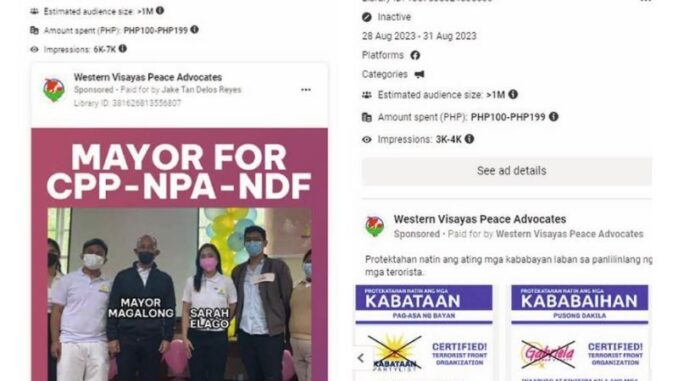
MANILA, Philippines — Facebook has failed to filter paid advertisements that falsely label activists as communist sympathizers even after human rights groups’ repeated attempts to flag it, according to a new report by an international rights watchdog.
The report by Amnesty International, published on Monday, October 14, found numerous paid ads on Meta’s (Facebook’s parent company) Ad Library that red-tag members of progressive party-lists Kabataan and Gabriela, whose representatives have also been directly vilified by the government’s anti-insurgency task force.
Despite Meta’s claims of clamping down on harmful content, its automated ad review system is giving dubious accounts free reign to amplify what is essentially a digital witch-hunt of progressive groups, according to Amnesty International’s investigation.
Besides the social media giant’s faulty ad review system, Amnesty International also criticized Meta’s broader failure to prevent government and non-government entities from using its platform to harass, intimidate and threaten human rights defenders in the Philippines.
RELATED: Online attacks vs young Filipino activists spilling into real world
Speaking to young human rights defenders and building on its analysis of Facebook content and ads, Amnesty International found consistent failures by Meta to enforce its community guidelines and to remove red-tagging content that incites hatred and violence.
“Inadequate content moderation and ad approval mechanisms, and a failure to track the effectiveness of its risk mitigation measures, have turned Facebook into an enabling environment that contributes to serious human rights violations,” Wilnor Papa, Head of Activism and Mobilization at Amnesty International Philippines, said.
Meta did not respond to Amnesty International’s request for comment on the findings of its report but said in a July 2024 letter that it “[assesses] allegations of red-tagging against a number of policies,” including its policy on coordinating harm and promoting crime.
Under this policy, Meta said it would remove content that “exposes the identity of someone who is alleged to be a member of an ‘at-risk’ group, where these allegations could lead to real-life harm.”
Leaky ad review system
Meta relies on automated technology to sift through its ads for harmful content, although it says it uses “human reviewers to improve and train our automated systems, and in some cases, to manually review ads.”
The whole process, Amnesty International said, is dysfunctional and poses “serious risks to human rights.”
For just P100 to P199, a single Facebook user was able to blast ads branding the Kabataan Party-list, which advocates for youth interests in Congress, as a terrorist group, reaching 6,000 to 7,000 users at once, based on Amnesty International’s investigation.
The report also found nearly 150 ads in Meta’s Ad Library linked to a specific account that was engaged in red-tagging, 23 of which identified progressive groups as “terrorist front organizations.” Meta later removed two identical copies of the ads for not complying with their advertising standards.
“Meta’s approval of the red-tagging ad, which evidently incites hatred and violence and poses a threat to a public official’s security, stands in clear contrast to its responsibility and public statements in relation to its efforts to address red-tagging,” Amnesty International said.
Meanwhile, a different Facebook account, which appeared to collaborate with the first, had 66 ads, many of which were paid for by the same person associated with the initial account.
“The pattern and number of posts suggest a significant level of professionalism of the account holder,” the study noted.
The report also found paid ads from March 2022 that red-tagged Baguio Mayor Benjamin Magalong and former Kabataan Party-list Representative Sarah Elago, branding them as associates of the Communist Party of the Philippines and its armed group. Magalong outlawed tarpaulins and posters red-tagging youth activists in the same month.
Another ad featured former President Rodrigo Duterte’s accusations on SMNI, where he labeled the ACT Teachers Party-list as a “communist front.” For just P500-599, this ad reached up to 60,000 users in five days.
Facebook’s complicity in rights violations
Meta started to review its content moderation system in 2021 to weed out red-tagging on its platform. Two years later, in 2023, it said its work to “increase capacity to address red-tagging” was “complete.”
The tech giant said it also briefed the Armed Forces of the Philippines in 2022 about its community standards and “provided a digital literacy session focused on critical thinking online.”
But for Amnesty International, the work is far from over as red-tagging content, even those that activists have “spammed” with reports to Facebook, continue to spread on the platform.
“We tried reporting these (Facebook) pages, but it just doesn’t stop,” said Miguel (not his real name), a 26-year-old Baguio-based activist who spoke to Amnesty International. “It’s very difficult to demand accountability because they [Meta] say, ‘we have community guidelines.’”
Now, Facebook’s “additional failure” of filtering ads that amplify red-tagging posts is another proof of the platform’s failure to conduct adequate human rights due diligence on its operations in the Philippines and to mitigate the risks posed by its platform to activists, the group said.
“Meta may state that it has increased its capacity to address the human rights risks posed by red-tagging, but affected human rights defenders report that red-tagging posts remain common, and that flagging red-tagging does not necessarily lead to the removal of such posts,” Amnesty International said.
“Far from ‘complete,’ Meta’s lacking human rights due diligence is failing young human rights defenders and contributing to the state-led human rights violations documented in this report,” it added.





Be the first to comment